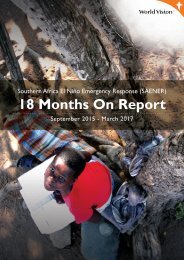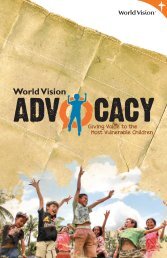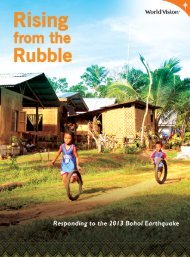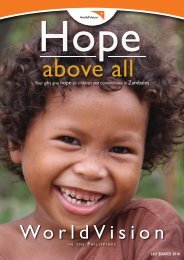INTER-AGENCY LIVELIHOOD ASSESSMENT - ARUA DISTRICT NORTHERN UGANDA GOAL
Create successful ePaper yourself
Turn your PDF publications into a flip-book with our unique Google optimized e-Paper software.
Figure 17: Average Expenses - Refugees Figure 18: Average Expenses - Host Community<br />
% Average HH Expenses<br />
Per Month - Refugees<br />
Own Agricultural<br />
Activites<br />
(Seeds & Tools)<br />
0.0397<br />
0.026<br />
0.493<br />
Food & Water<br />
0.1247<br />
Livestock<br />
Purchases<br />
0.1302 0.1153<br />
Own Livestock<br />
0.2961<br />
Support (Health/ 0.2079<br />
Feeding)<br />
0.6038<br />
Gifts/Loans/<br />
Charity<br />
0.4069<br />
% Average HH Expenses<br />
Per Month - Host Community<br />
Own Agricultural<br />
Activites<br />
(Seeds & Tools)<br />
Food & Water<br />
Livestock<br />
Purchases<br />
Own Livestock<br />
Support (Health/<br />
Feeding)<br />
Gifts/Loans/<br />
Charity<br />
Around 88% of the refugees reported spending cash of between 0 to 100,000 UGX per week on food,<br />
and 9% reported spending cash equivalent of between 100,000-200,000 UGX per week. Meanwhile,<br />
80% of the host communities spent up to 100,000 UGX per week and 14% between 100,000 and<br />
200,000 per week.<br />
Only 1% of refugees and 2% of the host communities reported that their spending ranges fall between<br />
200,001 to 300,000 and 300,001 to 500,000 UGX. Meanwhile, 2% of the host communities reported<br />
that they spend between 500,001 to 1 million UGX.<br />
Figure 19: Spending<br />
0 to 100,00 Ugx<br />
100,001 to 200,00 Ugx<br />
9%<br />
14%<br />
80%<br />
88%<br />
200,001 to 300,000 Ugx<br />
1%<br />
2%<br />
300,001 to 500,000 Ugx<br />
500,001 to 100,000,000 Ugx<br />
1%<br />
2%<br />
0%<br />
2%<br />
Future Events Likely to Change Household Spending Patterns<br />
To promote self-reliance and resilient communities, understanding risk and future events are<br />
essential to help households and communities plan by putting necessary actions to mitigate and<br />
manage the situation. From the surveyed respondents, household expenditure was affected by an<br />
increase or reduction in food ration for refugees while the host communities reported low/high yields<br />
from farming the most important events likely to affect the household expenditure.<br />
There is still a large population, 40% of refugees and 54% of the host communities, that are not aware<br />
of any events likely to affect their spending patterns despite most of them are experiencing cyclical<br />
shocks of different magnitudes. This lack of awareness puts them at risk, as they are not able to<br />
adequately prepare and plan.










